

Before Netscape: the forgotten Web browsers of the early 1990s. When Tim Berners-Lee arrived at CERN, Geneva's celebrated European Particle Physics Laboratory in 1980, the enterprise had hired him to upgrade the control systems for several of the lab's particle accelerators.

Is Facebook Making Us Lonely? - Magazine. Yvette Vickers, a former Playboy playmate and B-movie star, best known for her role in Attack of the 50 Foot Woman, would have been 83 last August, but nobody knows exactly how old she was when she died.
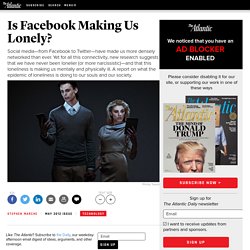
According to the Los Angeles coroner’s report, she lay dead for the better part of a year before a neighbor and fellow actress, a woman named Susan Savage, noticed cobwebs and yellowing letters in her mailbox, reached through a broken window to unlock the door, and pushed her way through the piles of junk mail and mounds of clothing that barricaded the house. Upstairs, she found Vickers’s body, mummified, near a heater that was still running. Her computer was on too, its glow permeating the empty space. The Los Angeles Times posted a story headlined “Mummified Body of Former Playboy Playmate Yvette Vickers Found in Her Benedict Canyon Home,” which quickly went viral.
National - Jennie Rothenberg Gritz - It's Not Just Porn: Why Ultra-Orthodox Jews Fear the Internet. At Citi Field Stadium this Sunday, 50,000 religious men gathered to discuss the dangers of the Web.

An organizer explains why the digital era is so challenging for the people of the book. "You Get On The Internet And Pretty Soon You’re Drunk": The Orthodox At Citi Field. America’s confessor. Frank Warren is the creator of PostSecret, one of the internet’s most successful sites.
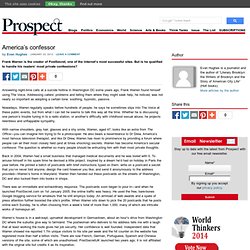
But is he qualified to handle his readers’ most private confessions? Answering night-time calls at a suicide hotline in Washington DC some years ago, Frank Warren found himself using The Voice. Addressing callers’ problems and telling them where they might seek help, he noticed, was not nearly so important as adopting a certain tone: soothing, hypnotic, passive. Inside search engines' war on bad results - tech - 15 December 2011. ANYONE can publish on the web, but it would be better if some people didn't; the world does not need another site that provides advice on how to unlock an iPhone or find cheap car insurance.
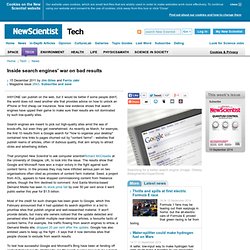
Now new evidence shows that search engines have upped their game to make sure their results are not dominated by such low-quality sites. Search engines are meant to pick out high-quality sites amid the sea of knock-offs, but even they get overwhelmed. As recently as March, for example, the first 10 results from a Google search for "how to organise your desktop" contained nine links to pages churned out by "content farms" - websites that publish reams of articles, often of dubious quality, that aim simply to attract clicks and advertising dollars.
How an omniscient Internet "sextortionist" ruined the lives of teen girls. In the spring of 2009, a college student named Amy received an instant message from someone claiming to know her.

Certainly, the person knew something about her—he was able to supply details about what her bedroom looked like and he had, improbably, nude photos of Amy. He sent the photos to her and asked her to have "Web sex" with him. Instead, Amy contacted her boyfriend Dave, who had been storing the naked photos on his own computer. (Note: victim names have been changed in this story). Cloud-Powered Facial Recognition Is Terrifying - Jared Keller - Technology. By harnessing the vast wealth of publicly available cloud-based data, researchers are taking facial recognition technology to unprecedented levels "I never forget a face," goes the Marx Brothers one-liner, "but in your case, I'll be glad to make an exception.
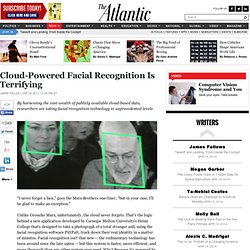
" Cryptocurrency. When the virtual currency bitcoin was released, in January 2009, it appeared to be an interesting way for people to trade among themselves in a secure, low-cost, and private fashion.
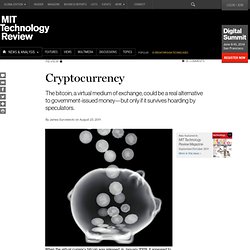
The Bitcoin network, designed by an unknown programmer with the handle “Satoshi Nakamoto,” used a decentralized peer-to-peer system to verify transactions, which meant that people could exchange goods and services electronically, and anonymously, without having to rely on third parties like banks. Its medium of exchange, the bitcoin, was an invented currency that people could earn—or, in Bitcoin’s jargon, “mine”—by lending their computers’ resources to service the needs of the Bitcoin network.
Once in existence, bitcoins could also be bought and sold for dollars or other currencies on online exchanges. Bitcoin online currency gets new job in web security - tech - 17 January 2012. IT HAS been a rocky year for Bitcoin, the online peer-to-peer currency, with the exchange rate soaring from a few cents to over $30 per coin before crashing after a string of thefts, hacks and other setbacks.
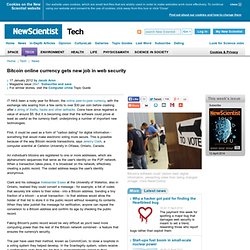
Coins have since regained a value of around $5. But it is becoming clear that the software could prove at least as useful as the currency itself, underpinning a number of important new technologies. First, it could be used as a form of "carbon dating" for digital information - something that would make electronic voting more secure.
This is possible because of the way Bitcoin records transactions, says Jeremy Clark, a computer scientist at Carleton University in Ottawa, Ontario, Canada. The Rise and Fall of Bitcoin. In November 1, 2008, a man named Satoshi Nakamoto posted a research paper to an obscure cryptography listserv describing his design for a new digital currency that he called bitcoin.
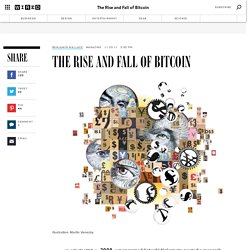
None of the list’s veterans had heard of him, and what little information could be gleaned was murky and contradictory. In an online profile, he said he lived in Japan. His email address was from a free German service. Why It’s Good that the Internet Is Changing Our Brains - Technology. Things are easier said than done, or so the old adage goes, and we couldn't agree more. That's why we do The GOOD 30-Day Challenge (#30DaysofGOOD), a monthly attempt to live better. Our challenge for August? Get off the internet at 8. There’s nothing like an article about how the internet is changing our brains to really freak people out. Infinite Stupidity. It might be useful, with such a statement like that, to review some of these big events.
Obviously one of the big events in our history was the origin of our planet, about 4.5 billion years ago. And what's fascinating is that about 3.8 billion years ago, only about seven or eight hundred million years after the origin of our planet, life arose. Online echo chambers: A study of 250 million Facebook users reveals the Web isn’t as polarized as we thought.
Illustration by Alex Eben Meyer. Farhad Manjoo is a technology columnist for the Wall Street Journal and the author of True Enough. Follow. The Rise of the Zuckerverb: The New Language of Facebook - Ben Zimmer - Technology. Last week, as he paced around the stage at the f8 Developers Conference, Mark Zuckerberg declared with wide-eyed optimism that Facebook was "helping to define a brand-new language for how people connect. " Media companies revisit their AOL days with Facebook. Among the news announcements at Facebook’s giant f8 developers conference on Thursday (we’ve collected the news in one place if you want to catch up) was the launch of social apps for media consumption. This included music apps like Spotify and video apps like Hulu, but also news-reading apps from a series of media players — including newspapers such as The Washington Post and The Guardian, as well as digital-only outlets like News Corp.’s The Daily and Yahoo News.
Although Facebook CEO Mark Zuckerberg championed these apps as “rethinking the whole way the news industry works” through social sharing of content, it seems more like those media outlets have signed over a big part of their destiny to something that feels like an AOL-style web “portal.” The apps themselves are very similar to what the Wall Street Journal recently launched with its “WSJ Social” app (the Journal wasn’t part of the official Facebook launch, and says it came up with the app on its own).
Google. Facebook. The Great Tech War Of 2012. Dropbox: The Inside Story Of Tech's Hottest Startup. Google Drive: Why you’re a sucker if you pay for online file storage. How Russian Tycoon Yuri Milner Bought His Way Into Silicon Valley. How Gmail destroyed Outlook.
As of this week, Gmail has reached perfection: You no longer have to be online to read or write messages. Desktop programs like Microsoft Outlook have always been able to access your old mail. How Yahoo Killed Flickr and Lost the Internet. "Groupon Is A Disaster" Why Groupon is poised for collapse. Why Siri Is a Google Killer. Facebook vs. Google: The battle for the future of the Web - Nov. 3. FORTUNE -- Paul Adams is one of Silicon Valley's most wanted. Will Robert Kyncl and YouTube Revolutionize Television? On a rainy night in late November, Robert Kyncl was in Google’s New York City offices, on Ninth Avenue, whiteboarding the future of TV.
Kyncl holds a senior position at YouTube, which Google owns. The Jig Is Up: Time to Get Past Facebook and Invent a New Future - Alexis Madrigal - Technology. How the Professor Who Fooled Wikipedia Got Caught by Reddit - Yoni Appelbaum. You Don’t Have to Tweet to Twitter. Inside the Eastern Rise of Weibo, China’s Twitter. Twitter, the Startup That Wouldn't Die.
Technology - Alexander Furnas - When Twitter Stumbles, Sites Across the Web Go Down With It. How Twitter Makes the Internet More Local. Expanded tweets: Tweets are about to get a whole lot longer. Hooray! Forget the fantasy of porn-free youth - Pornography. A Privacy Manifesto in Code: What If Your Emails Never Went to Gmail and Twitter Couldn't See Your Tweets? - Alexis Madrigal - Technology. Please read this: A very important speech about social media in America. Accessibility vs. access: How the rhetoric of “rare” is changing in the age of information abundance. Optical Memory Could Ease Internet Bottlenecks. The Promise and Perils of Pinterest. Pinterest’s Terms of Service, Word by Terrifying Word. News - Life after Firefox: Can Mozilla regain its mojo? Six degrees of aggregation.